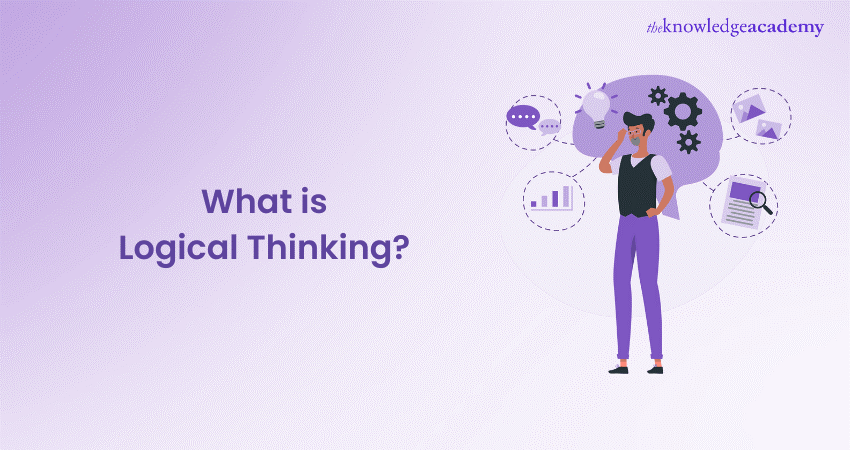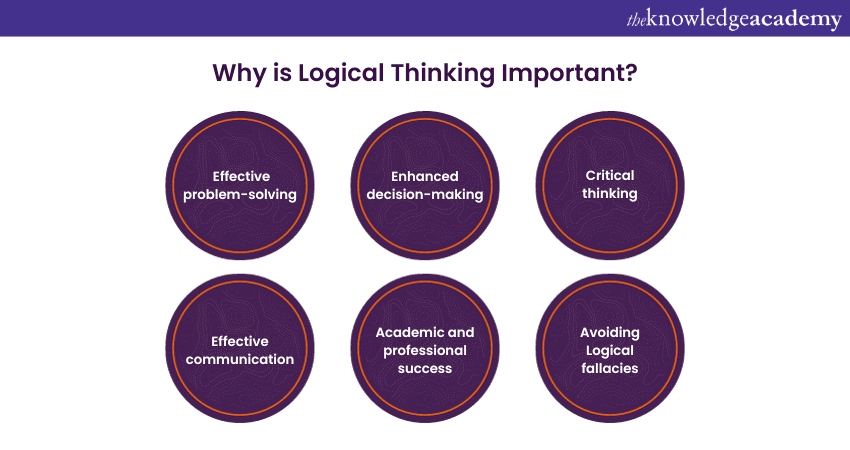We may not have the course you’re looking for. If you enquire or give us a call on 01344203999 and speak to our training experts, we may still be able to help with your training requirements.
Training Outcomes Within Your Budget!
We ensure quality, budget-alignment, and timely delivery by our expert instructors.

Logical Thinking is a fundamental cognitive skill that allows you to reason, analyse, and make sound decisions in various aspects of life. In other words, Logical Thinking is the process of examining a situation and making sound judgments or decisions based on evidence or facts.
Whether you're solving a complex problem, engaging in critical discussions, or just navigating your daily routines, Logical Thinking plays a pivotal role in ensuring that your thoughts and actions are rational and coherent. In this blog, we will discuss What is Logical Thinking in detail, its importance, and its components. You'll also learn about the various ways that make up Logical Thinking and how to develop this essential skill.
Table of contents
1) Understanding Logical Thinking
2) Components of Logical Thinking
3) Why is Logical Thinking important?
4) What are Logical Thinking skills?
5) Developing Logical Thinking skills
6) Exercises to improve Logical Thinking
7) Conclusion
Understanding Logical Thinking
Logical Thinking is the capacity to employ reason and systematic processes to analyse information, establish connections, and reach well-founded conclusions. It entails a structured and rational approach to problem-solving and decision-making.
For example, consider a scenario where you're presented with a puzzle. To logically think through it, you would assess the provided clues, break down the problem into smaller elements, and systematically find potential solutions. You'd avoid hasty or emotion-driven judgments and rely on evidence and sound reasoning to arrive at the correct answer, showcasing the essence of Logical Thinking in problem-solving.
Components of Logical Thinking
After knowing What is Logical Thinking, let’s move on to the key components of Logical Thinking. Logical Thinking comprises several key components that work together to facilitate reasoned analysis and problem-solving. Here are the following key components of Logical Thinking.
1) Deductive reasoning: Deductive reasoning involves drawing specific conclusions from general premises or facts. It's like moving from a broad idea to a more specific conclusion. For example, if all humans are mortal, and Socrates is a human, then you can logically conclude that Socrates is mortal.
2) Inductive reasoning: Inductive reasoning is the procedure of forming general conclusions based on specific observations or evidence. It's the opposite of deductive reasoning. For instance, if you observe that the sun has risen every day, you might inductively reason that the sun will rise again tomorrow.
3) Causal inference: Causal inference is the ability to identify cause-and-effect relationships between events, actions, or variables. It involves understanding that one event or action can lead to another event as a consequence. In essence, it's the recognition that a specific cause produces a particular effect.
4) Analogy: Analogical reasoning or analogy involves drawing similarities and making comparisons between two or more situations, objects, or concepts. It's a way of applying knowledge or understanding from one context to another by recognising shared features or characteristics. Analogical reasoning is powerful because it allows you to transfer what you know in one domain to another, making it easier to comprehend and solve new problems.
Why is Logical Thinking Important?

Logical Thinking is a vital cognitive skill that holds huge significance in several aspects of life. It enables individuals to navigate complex challenges, make informed decisions, and engage in thoughtful analysis. Here are key reasons highlighting the importance of Logical Thinking.
1) Effective problem-solving: Logical Thinking equips individuals with the ability to dissect complex problems, identify patterns, and devise systematic solutions. Whether it's troubleshooting a technical issue or resolving personal dilemmas, Logical Thinking ensures that problems are approached with a structured and efficient methodology.
2) Enhanced decision-making: Making sound decisions is a cornerstone of success in both personal and professional life. Logical Thinking allows individuals to evaluate options, consider consequences, and choose the most rational course of action. This is particularly critical in high-stakes situations.
3) Critical thinking: Logical Thinking is at the core of critical thinking. It encourages individuals to question assumptions, seek evidence, and challenge existing beliefs. This capacity for critical analysis fosters a deeper understanding of complex issues and prevents the acceptance of unfounded or biased information.
4) Effective communication: In discussions and debates, Logical Thinking helps individuals express their ideas and viewpoints clearly and persuasively. It enables individuals to construct well-structured arguments, provide evidence, and counter opposing views, fostering productive and respectful communication.
5) Academic and professional success: Logical Thinking is highly valued in educational settings and the workplace. It allows students to excel academically by tackling challenging coursework and assignments. In the professional world, it's a key attribute for problem-solving, innovation, and career advancement.
6) Avoiding Logical fallacies: Logical Thinking equips individuals with the ability to recognise and avoid common logical fallacies such as circular reasoning, straw man arguments, and ad hominem attacks. This safeguards them from being deceived or manipulated by flawed or deceptive arguments.
Supercharge Your Sales with our Sales Negotiation Skills Course. Check out now and close deals like a pro!
What are Logical Thinking skills?
Logical Thinking skills are cognitive abilities that allow individuals to process information, analyse it systematically, and draw reasonable conclusions. These skills enable people to approach problems, decisions, and challenges with a structured and rational mindset.
Developing Logical Thinking skills
Developing strong Logical Thinking skills is essential for improved problem-solving, decision-making, and critical analysis. Here are some key strategies to help you enhance your Logical Thinking abilities.
1) Practice critical thinking: Engage in activities that require critical thinking, such as analysing articles, solving puzzles, or evaluating arguments. Regular practice sharpens your analytical skills.
2) Learn formal logic: Study the principles of formal logic, which provide a structured approach to reasoning. This can include topics like syllogisms, propositional logic, and predicate logic.
3) Identify assumptions: When faced with a problem or argument, be aware of underlying assumptions. Question these assumptions and consider how they impact the overall reasoning.
4) Break down problems: When tackling complex problems, break them down into smaller, more manageable components. Analyse each component individually before looking at the problem as a whole.
5) Seek diverse perspectives: Engage in discussions and debates with people who hold different viewpoints. This helps you consider a range of perspectives and strengthens your ability to construct and counter-arguments.
6) Read widely: Reading a variety of materials, from academic articles to literature, exposes you to different modes of reasoning and argumentation. This broadens your thinking and enhances your ability to connect ideas.
7) Solve puzzles and brain teasers: Engaging in puzzles, riddles, and brain teasers challenges your mind and encourages creative problem-solving. It's an enjoyable way to exercise your Logical Thinking.
8) Develop mathematical skills: Mathematics is a discipline that heavily relies on Logical Thinking. Learning and practising mathematical concepts and problem-solving techniques can significantly boost your logical reasoning skills.
Unlock Your sales potential with our Soft Skills Training For Sales Professionals. Elevate your sales game today and boost your success – register now!
Exercises to improve Logical Thinking
Enhancing your Logical Thinking skills is achievable through various exercises and activities. Here are some practical exercises to help you strengthen your Logical Thinking abilities:
1) Sudoku puzzles: Solve Sudoku puzzles, as they require logical deduction to fill in the missing numbers.
2) Crossword puzzles: Crosswords challenge your vocabulary and logical word placement.
3) Brain teasers: Engage in brain teasers and riddles that encourage creative problem-solving.
4) Chess and board games: Play strategic board games like chess, checkers, or strategic video games that require forward thinking and planning.
5) Logical argumentation: Engage in debates or discussions where you must construct reasoned arguments and counter opposing viewpoints.
6) Coding and programming: Learn coding and programming languages which promote structured and Logical Thinking in problem-solving.
7) Mathematical challenges: Solve mathematical problems and equations, as mathematics is inherently logical.
8) Mensa puzzles: Work on Mensa puzzles, which are designed to test and strengthen Logical Thinking skills.
9) Logic games: Play logic-based games like Minesweeper or Mastermind.
10) Logical analogy exercises: Practice solving analogy exercises, which test your ability to find relationships between words or concepts.
11) Visual logic puzzles: Tackle visual logic puzzles like nonograms or logic grid puzzles.
12) Critical reading: Read books, articles, or academic papers and critically analyse the arguments and evidence presented.
13) Coding challenges: Participate in online coding challenges and competitions that require logical problem-solving in coding.
14) Scientific method: Conduct simple science experiments or projects, applying the scientific method to develop hypotheses and draw logical conclusions.
15) Poker or card games: Play card games like poker, where you must strategise and make logical decisions based on probabilities and information.
16) Analyse real-world situations: Analyse real-world situations or news stories, evaluating the information, causes, and potential consequences.
These exercises will help you practice and enhance your Logical Thinking skills in a fun and engaging way, making them an integral part of your problem-solving and decision-making toolkit.
Take your sales to the next level! Elevate your skills with our Sales Training. Join us today!
Concluson
In this blog, we have discussed What is Logical Thinking, its importance, its components and ways to improve this skill. When you learn how to think logically, you start gathering each and every information as much as possible, analyse the facts, and methodically choose the best way to go forward with your decision. Logical Thinking is considered the most important tool in brainstorming ideas, assessing issues and finding solutions.
Master the art of effective meetings. Elevate your Meeting Skills for success. Get started now!
Frequently Asked Questions
Upcoming Business Skills Resources Batches & Dates
Date
 Time Management Training
Time Management Training
Fri 24th May 2024
Fri 28th Jun 2024
Fri 26th Jul 2024
Fri 23rd Aug 2024
Fri 27th Sep 2024
Fri 25th Oct 2024
Fri 22nd Nov 2024
Fri 27th Dec 2024







 Top Rated Course
Top Rated Course



 If you wish to make any changes to your course, please
If you wish to make any changes to your course, please


